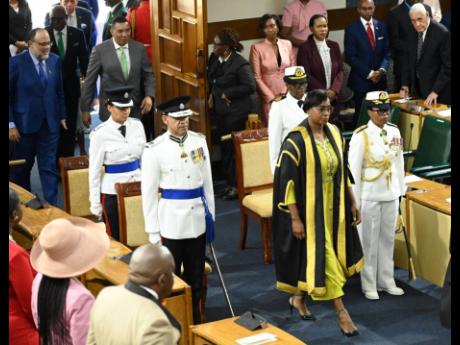Editorial | Go to court on AG opinion
The attorney general’s (AG) denial of an access to information request for the advice provided to Parliament on how to handle reports by the auditor general (AuG) is not, on its face, surprising.
Derrick McKoy’s chambers relied on Section 17 (a) of the Access to Information Act which precludes the disclosure of the official documents if they would be “privileged from production in legal proceedings on the ground of legal professional privilege”.
This, fundamentally, is an assertion of lawyer/client privilege, which, essentially, places the ball back into the court of Juliet Holness, the Speaker of Parliament, whose rigid stance against releasing Dr McKoy’s opinion has raised serious questions not about Mrs Holness’ political judgement, but of public and constitutional law.
The issue is whether Mrs Holness, as the Speaker of the House, can withhold from other members of parliament, and by extension the public (thereby treating as private) a legal opinion that was requested by her predecessor in an official capacity. There is also the question, as the rights group, Jamaicans for Justice (JFJ), has raised, of who, in the specific circumstances, is the attorney general’s clients and his obligations thereto.
This newspaper believes these are important matters that ought to be resolved by the courts so as to provide clarity, establish at least minimum standards of transparency to which speakers are bound, and to prevent the distractions of the kind that has shrouded the work of Parliament for several months.
JOIN IN
Stakeholders, including public policy and transparency campaigners, who can show standing in the matter, should join in asking an appropriate arm of the court for a ruling on the validity of Mrs Holness’ action, as well as what the limits on the powers of the Speaker are, and any assertion of the right of Parliament to determine how it conducts its business.
This is rooted in the decision last year by the former Speaker, Marisa Dalrymple-Philibert, to end the old convention of immediately tabling reports sent to Parliament by the auditor general. Instead, Mrs Dalrymple-Philibert ruled that those reports would have to wait for two months, giving the requisite ministers time to comment on them.
This, she said, was in keeping with the requirements of the Financial Administration and Audit Act and the Public Bodies Management and Accountability Act.
Mrs Dalrymple-Philibert also ruled that reports from the Integrity Commission would first be sent to a parliamentary oversight committee before being tabled.
These decisions were met with outrage by the parliamentary Opposition and in the wider society, especially when it emerged that the Speaker had requested, and received, opinions from the attorney general, which she declined to publish. The Speaker, however, quoted from an opinion by the parliamentary counsel that gave cover to her actions.
When before her rulings took full effect Mrs Dalrymple-Philibert was forced to resign over claims of misuse of a vehicle duty rebate scheme, Mrs Holness, the new Speaker, decided to stick with her predecessor’s decisions, but with modifications. The time lag on auditor general’s reports would remain, but only some categories of reports from the Integrity Commission would first be reviewed by the oversight committee.
Mrs Holness also decided to release the opinions by the parliamentary counsel, but not those from the attorney general.
Meantime, after months in limbo at Parliament, two reports were in March returned to the AuG. They were promptly sent back by the auditor general, Pamela Monroe Ellis.
ISN’T CLEAR
It isn’t clear whether Ms Monroe Ellis’ decision was based on her reading of the Constitution with respect to the tabling of reports done by her office, or because of the length of time the documents were with the legislature before their return.
In the event, Mrs Holness tabled to those documents, but indicated that her decision was only because Parliament was going into a month’s recess. She also implied that her underlying ruling remained.
It would be a messy affair should Ms Monroe Ellis continue to forward reports to the House for them to only land in parliamentary purgatory or sent back by the Speaker.
In that context, the opinion of the attorney general is important, to be contrasted against that from the parliamentary counsel upon which Mrs Holness hangs her decision. It is against the norms of transparency and good governance that, whatever its conclusions, the Speaker should want to keep the attorney general’s opinion secret.
Jamaicans for Justice, through its executive director, Mickel Jackson, raised an important question of who, in this case, was the attorney general’s – the legal advisor to the government – client, and whether what he did amounted to legal advice to the government, covered by confidentiality, or merely sharing an opinion on law sought on Parliament’s behalf.
She said, “JFJ is of the view that the attorney general’s ultimate client is not the government, by way of the Cabinet, but the public. The attorney general should therefore have the power and an obligation, if necessary, to publish his legal views on important matters, while maintaining the confidentiality of discussions with the Cabinet.”
These issues should be ventilated in court.

